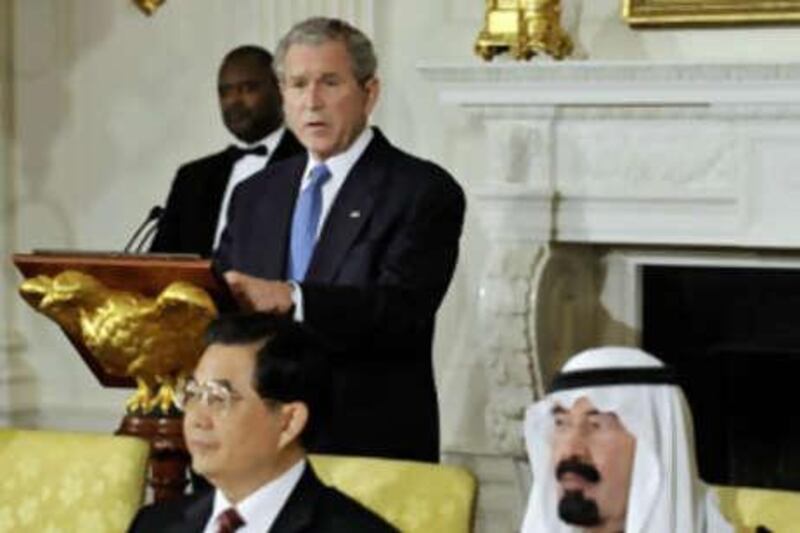As leaders of the world's most powerful economies converged on Washington yesterday, previous optimism that the Group of 20 conference might find a framework for solving the global financial crisis was already cooling. Several European leaders had trumpeted the need over the past month for a "new Bretton Woods" to redraw the global financial architecture and erase its perceived failures, a reference to the 1944 meeting that founded the International Monetary Fund (IMF).
But the political swagger surrounding the summit would seem to belie the obstacles that face it: the lame-duck status of its host, George W Bush, the outgoing US president; the European Union's announcement yesterday that the 15-nation Euro zone is now in recession; and the persistent finger-pointing that has characterised much of the recovery effort so far. Given such significant stumbling blocks, many analysts and economists have said the conference, which ends this evening, is unlikely to produce anything more than an agreement on the need for further dialogue.
"It would be exaggerated to expect concrete measures," Peer Steinbrueck, Germany's finance minister, told reporters in Berlin ahead of the summit. The meeting would be a success if leaders could agree on a "mandate to develop a regulatory and institutional framework for the financial markets", he said. Richard Baldwin, an economics professor at the Graduate Institute in Geneva, agreed: "There's no way that they are going to agree to any fundamental reforms."
One such talked-about reform has been the greater inclusion of emerging markets, such as the Gulf states, into the decision-making apparatus of the IMF, the global financial system's lender of last resort, in return for cash injections. Such a change, said observers, could augur a new, post-crisis reality where rapidly developing countries such as the UAE, Saudi Arabia, China, Russia, India and Brazil have more economic strength and demand greater political power.
"If you look at the people who lead the IMF now, they were the ones who were able to help people out at the end of World War II. That's how they got their seats," said Prof Baldwin. "This is one of those moments where you can get your seat at the table for a reasonably small amount of cash." This weekend, bidding appeared to open for seats at the grown-ups table of global financial decision-making. Japan pledged US$100 billion (Dhs367bn) to the IMF's US$250bn bailout fund yesterday. The global financial body has also turned its attention to China and Middle East, whose only representative at the summit was Saudi Arabia.
Gordon Brown, the prime minister of the United Kingdom, finished a tour of the Gulf earlier this month in an effort to solicit funding for the IMF. In return, Mr Brown hinted at granting concessions to Saudi Arabia's political and economic goals, such as greater voting power in the IMF and a more welcoming attitude in the West to sovereign wealth funds. But some analysts have seen an even wider opportunity for the member states of the Gulf Cooperation Council (GCC), who could use the West's cap-in-hand approach for greater political recognition.
"The other participating countries, including the US, must understand that seeing the position of the GCC states in economic terms alone is no longer sufficient," wrote Abdulaziz Sager, the chairman of the Gulf Research Centre, in an opinion piece in The National yesterday. If the world's traditional powerhouses want cash, wrote Mr Sager, they will have to concede major ground on issues from international nuclear proliferation and the Israeli-Palestinian conflict to the GCC's regional integration.
But such goals are unlikely to materialise in the near-term, said Mustafa Alani, a programme director at the Gulf Research Centre. While the Gulf region may be in a position to gain politically by financing a solution to the global financial crisis, they are facing problems of their own that may limit future political posturing. "We need a stronger voice in the international system, but I think that this is the wrong timing because their priority is not going to be the international system" but their own domestic challenges, such as declining oil prices, said Dr Alani.






